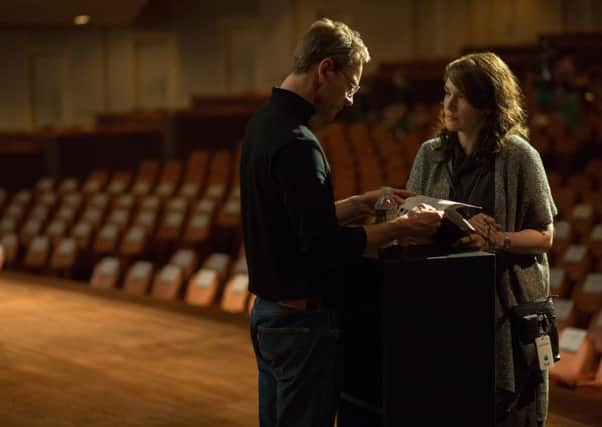Hatchet jobs? How filmmakers tried to do justice to Apple boss


“I turned up expecting a sleepy morning at an animated film with my kids and just feeling like I’d been reborn. I remember thinking, ‘The world has changed’ [and that] everything was going to be different.”
The groundbreaking Toy Story was made by Pixar, the company Jobs bought into in the late 1980s. Thus this revolutionary creative – the co-founder of Apple – helped shape the future of animated movies, computers, phones, music and the digital arts.
Advertisement
Hide AdAdvertisement
Hide AdIt was that obsessional trait, that single-minded pursuit of uniqueness to the exclusion of all else, that marked out Steve Jobs as a visionary. And via Aaron Sorkin’s dense, 185-page script we get a dramatic re-telling of three key chapters in Jobs’ life.
Scattered over 14 years starting in 1984 (the Apple Macintosh), then 1988 and finally 1998, Boyle’s picture shows the evolution of Jobs’ character and his status as an almost mythical figure of the late 20th and early 21st centuries.
“Would somebody who came to this movie walk away with a fair sense of who Steve Jobs was?” asks Sorkin. “I don’t know what a fair sense of anybody is. If you asked a thousand people who knew Steve Jobs for their impressions of him you’d get a thousand different impressions.
“What you don’t see in this movie is a dramatic recreation of his Wikipedia page. You see something much different. What you see is a dramatisation of several of the personal conflicts that he had in his life and they illustrate something. I do believe they’re fair. My conscience is clear.”
Advertisement
Hide AdAdvertisement
Hide AdSorkin bases his action on the same building blocks, which he creates and knocks down three times: a confrontation with key collaborators before each of three product launches.
He calls it “plainly a writer’s conceit.” But argues that the film “gets at some larger truths, some more important truths than what really went on in the 40 minutes before product launches which I don’t think was the stuff of drama.”
Sorkin has praised Boyle for bringing a theatrical dimension to the piece – that and hiring an ensemble that includes Michael Fassbender as Jobs, Kate Winslet as Apple marketing guru Joanna Hoffman, Seth Rogen as Apple co-founder Steve Wozniak and Jeff Daniels as Apple CEO John Sculley. Daniels is practised at presenting what’s been dubbed “Sorkinese” wordplay via the TV show The Newsroom, which has a foundation of lengthy speeches and overlapping dialogue. For Fassbender and Winslet the task was somewhat trickier.
Boyle recalls receiving the script, which was primarily dialogue with few stage directions à la the traditional scripts that land on his doormat.
Advertisement
Hide AdAdvertisement
Hide Ad“You’ve got to get great actors to pull off this stuff – which I’m delighted to say we did – to make it as rich an experience as possible for the audience. And we wanted to make it an immersive experience so that you were immersed in those actors and their world.”
Fassbender called the script “exceptional”. Winslet called it “incredible”. She added: “When I first read it – page 1, page 2 – [I thought] ‘God! Wow… People talk for a long time. How are we going to get through this one?’ But my immediate reaction, aside from how incredible it was to read, was how Aaron writes the way that people think. I don’t think I’ve ever really come across that to this extent.
“Much has been made about the length of the script and how much you had to learn: you’re an actor; you learn your lines. That’s the first thing you do with it. The pressure really comes in not forgetting them. That really is it because you foul everyone up.
“That was the pressure because it’s not just the actors that you’re walking and talking with. There’s so much concentration going on [with the crew] that it really does fall to the actors if you forget something.”
Advertisement
Hide AdAdvertisement
Hide AdFassbender, still only 38, has just been seen in a lauded film version of Macbeth. He’s used to heavy-duty dialogue. But the Steve Jobs script gave him pause.
“It’s a one-off that you get scripts like this, certainly modern scripts,” he says. “It’s just the best script that I’ve read. Nowadays most scenes comprise ten sentences. All of the electricity in this film is dialogue driven. It’s a rare, rare opportunity.”
Boyle reserves his greatest praise for Fassbender, who carries the film. A replacement for originally slated Leonardo DiCaprio and Christian Bale, Fassbender made the most of Jobs’ character flaws, his obsession with perfection and his fractured personal relationships with colleagues and, most pertinently, his daughter.
“Michael is an uncompromising actor and in some way I connected that with Jobs,” reveals Boyle. “He’s not interested in a hatchet job or a deification. He’s interested in the way Jobs pursued affection in his work. To watch Michael work in pursuit of that was really uncompromising and I think it lifted the level of all the actors.
Advertisement
Hide AdAdvertisement
Hide Ad“To see where it emerged from and who that person was or a version of who that person was is essential for all of us – and for this business and storytellers generally to look at his life. It was an amazing experience for all of us.”
Steve Jobs (15) is on nationwide release.